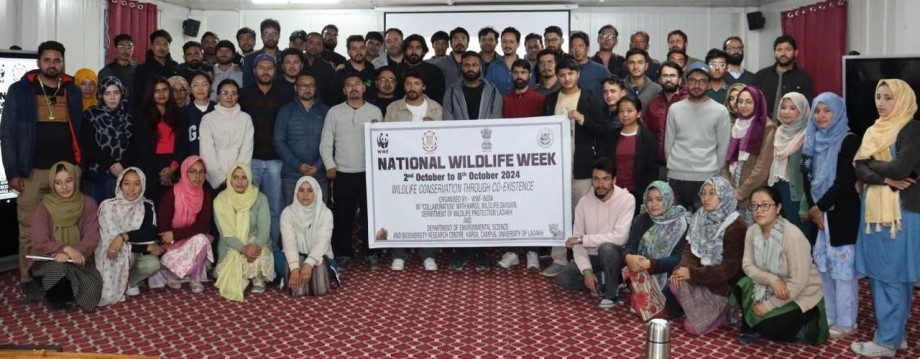Wildlife conservation in focus: Kargil campus celebrates National Wildlife Week 2024

The National Wildlife Week observed by the Kargil Campus, University of Ladakh, concluded on October 8, 2024. The week-long event brought together conservationists, academicians, and students to discuss strategies, challenges, and the integration of modern technology in wildlife protection.
The wildlife week was jointly organized by the Department of Environmental Science and the Biodiversity Research Center, Kargil Campus, University of Ladakh, in collaboration with the World Wildlife Fund (WWF) and the Kargil Wildlife Division, Department of Wildlife Protection, Ladakh. The event aimed to raise awareness about the importance of wildlife conservation, especially in Ladakh's fragile ecosystem, home to many unique species.
On the concluding day, Dr. Mehboob Ali, In-Charge Administration, Kargil Campus, emphasized the urgent need for collaborative efforts toward wildlife conservation, particularly in light of the region's vulnerabilities to climate change and human encroachment. He highlighted how academic collaborations with organizations like WWF could serve as a foundation for future biodiversity preservation efforts in Ladakh.
A key feature of the event was a series of expert lectures addressing various dimensions of wildlife ecology and conservation. Preet Sharma and Mohd Kazim, Project Officers from the Kargil Wildlife Division, delivered a comprehensive lecture on Wildlife Ecology. Their presentation explored ecosystem complexities, focusing on the delicate balance between wildlife and their natural habitats. They addressed issues like habitat fragmentation and human-induced environmental disruptions, explaining how these changes impact biodiversity in Ladakh and stressing the importance of maintaining this balance.
Dr. Mohd Baqir, Assistant Professor in the Department of Environmental Science at the University of Ladakh, provided an insightful lecture on the Challenges and Mitigation Measures for Wildlife Biodiversity Conservation in Ladakh. He discussed the multiple threats facing wildlife, including poaching, climate change, and habitat degradation. Dr. Baqir emphasized the need for stringent conservation policies and community-driven efforts to protect vulnerable species. He also highlighted sustainable practices, such as eco-tourism, as tools for promoting both local economic development and wildlife conservation.
The role of modern technology in conservation was showcased through a thought-provoking lecture by Jigmet Yangchan, Project Associate from the Department of Computer and IT, on the Role of Artificial Intelligence (AI) in Wildlife Conservation. Jigmet explained how AI algorithms like YOLO (You Only Look Once) have revolutionized wildlife monitoring and data collection. She demonstrated how AI, combined with satellite imagery and drones, enables real-time wildlife tracking, poaching detection, and habitat surveillance—offering solutions to conservation challenges in remote regions like Ladakh, where traditional methods face limitations due to the harsh terrain.
The event concluded with a felicitation ceremony, during which guest speakers were honored for their contributions to wildlife conservation. The winners of the painting competition, organized earlier in the week, were also awarded. Leela Banoo from the Department of Botany received the first prize, while Mansoor Hussain from the Department of Environmental Science received the second prize.
Raza Ali, Wildlife Warden of Kargil, reiterated the importance of sustained efforts in wildlife preservation and acknowledged the role of academic institutions in nurturing environmentally conscious citizens. He assured that his department remains committed to collaborating with the university to provide expertise and resources for wildlife conservation in Ladakh.
National Wildlife Week 2024 was a resounding success, shedding light on critical ecological challenges in Ladakh and fostering knowledge exchange on wildlife conservation. The event not only raised awareness but also encouraged proactive participation in preserving the region’s unique biodiversity. The event marked a significant milestone in ongoing efforts to protect Ladakh's wildlife through the integration of traditional values, cutting-edge technology, and scientific expertise.





